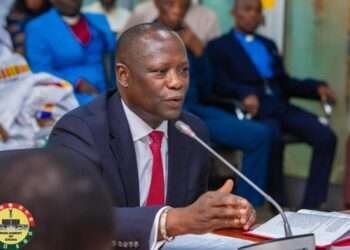Executive director of the Institute for Education Studies (IFEST), Dr Peter Anti, has expressed disappointment in the seeming lack of a plan to help address infrastructure problems within the country’s basic schools.
According to him, data from the ministry of education on the nature of school buildings which are classified into those in need of major repairs, minor repairs and those that don’t need repair at all hasn’t been of much help to address the challenge.
He revealed that a look at the data suggests that even in terms of school buildings, most of them are going down.
“I have studied all basic schools in Ghana. So, I know the data from 2000 to 2021, and I can tell you as a matter of fact that from 2016 to 2021, all our basic schools, in terms of all the infrastructure they deserve, have deteriorated… Infrastructure goes beyond the building, it includes certain variables like desks, access to road, water, toilet facilities, electricity, computers, school libraries and all those things that if you look at literature, education measures.”
Dr Peter Anti
Dr Anti indicated that a thorough plan from the ministry of education would have brought into perspective the number of schools that had challenges with repairs and those that were moved from buildings that needed major repairs to buildings that needed minor repairs.
However, he lamented that “nothing of that sort is in the data” provided by the ministry.
“So, all we see every day is a complete deterioration of all our basic school infrastructure and it’s disheartening because there’s no plan to ensure that at least, some of the schools that are even classified as deprived are moved a little from their deprivation status… These are things that have not happened.”
Dr Peter Anti
Resolving infrastructure challenges in basic schools
Citing a school in Noka in the eastern region, Dr Anti noted that the deplorable nature of schools in the community is not the best.
Ideally, he stated that there should be plans put in place to ensure that as the country progresses in its development journey, these challenges that come up are addressed.
Because we don’t have a plan, you would see as it is the case in most instances, that the authorities will visit some of these schools that you are highlighting and go with some cameras and supply them with one or two of the things they need and go and sit back in Accra…
“These kids are supposed to have quality education and we boast about quality education a lot. We say that we want to offer quality education to all children irrespective of your location, socioeconomic background and we tout this, but you cannot tell me that these kids in these schools are being given quality education.”
Dr Peter Anti
Furthermore, Dr Anti highlighted that currently there’s an infrastructure mapping that the education ministry is undertaking. This, he noted, is in a bid to see how schools are distributed evenly and the level of infrastructure that is available to them.
He explained that with such data, all that the ministry needs to do is to plan, allocate resources to at least 10% of schools facing infrastructure challenges every year.
Moreover, he expressed optimism that within the shortest possible time, there will be a complete transformation of Ghana’s basic schools once measures are effected.
“Again, you should prioritize the schools that you focus on because you know that you have schools that are deprived. When they do the mapping, these schools they know where they are located. The ministry of education is doing a GPS mapping of all their schools, they know where these schools are located. So, nobody can tell me that they don’t know the state of a school like this…”
Dr Peter Anti
READ ALSO: Ghana Signs $50Million Emission Reduction Payment Agreement Under LEAF Coalition




















